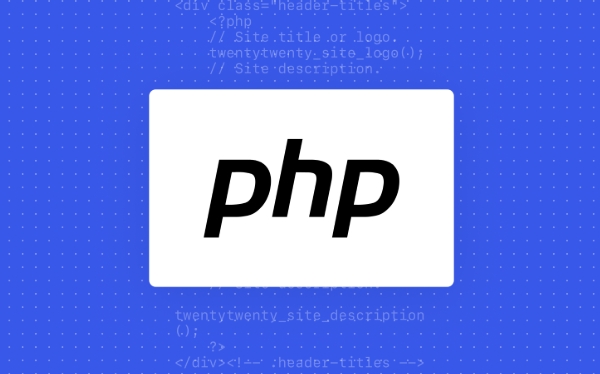 Backend Development
Backend Development
 PHP Tutorial
PHP Tutorial
 Demystifying PHP Compilation: Building a Custom PHP from Source for Optimal Performance
Demystifying PHP Compilation: Building a Custom PHP from Source for Optimal Performance
Demystifying PHP Compilation: Building a Custom PHP from Source for Optimal Performance
Jul 25, 2025 am 06:59 AMCompiling PHP from source is not necessary for most projects but provides full control for peak performance, minimal bloat, and specific optimizations. 2. It involves converting PHP’s C source code into executables, allowing customization like stripping unused extensions, enabling CPU-specific optimizations, and integrating custom libraries, potentially yielding 5–15% better throughput. 3. To build PHP 8.3 from source, install dependencies, download the source, configure with performance-focused flags (e.g., --disable-debug, --enable-opcache, --without-pear), compile with make, and install to a custom directory to avoid conflicts. 4. Key configuration options include setting --prefix for isolation, enabling FPM for web use, disabling CGI and PEAR to reduce overhead, and tuning opcache in php.ini with settings like opcache.memory_consumption=256 and opcache.validate_timestamps=0 in production. 5. Performance gains come from smaller binaries, compiler optimizations (e.g., -march=native), tighter library integration, and workload-specific opcache tuning. 6. Aggressive compiler flags like -O2 and -march=native can be set via CFLAGS before configure to optimize for the host CPU, but -O3 should be avoided due to potential cache penalties. 7. Major pitfalls include no automatic security updates, difficulty managing extensions later, debugging challenges without debug symbols, and lack of binary portability when using CPU-specific flags. 8. This approach is best suited for dedicated servers or high-traffic applications where control and efficiency matter, but it's overkill for shared hosting or small projects. 9. Final recommendations include using make clean when reconfiguring, saving the configure command in a script for reproducibility, testing with real-world workloads using tools like Apache Bench or k6, and containerizing the build with Docker for consistent deployment. Compiling PHP from source offers measurable performance benefits when done correctly, but requires careful maintenance and thorough testing to justify the operational overhead.

Why Compile PHP from Source?

You don’t need to compile PHP from source for most projects—pre-built packages from your OS or tools like Homebrew, Docker, or package managers (like apt or yum) work just fine. But if you're chasing peak performance, minimal bloat, or specific low-level optimizations, building PHP from source gives you full control. This guide walks through the why, how, and pitfalls of compiling PHP yourself for optimal performance.
1. What "Compiling PHP" Actually Means
PHP is written in C. When you download the PHP source code, you’re getting C files that need to be compiled into a binary executable your system can run. The standard php CLI, the php-fpm process, or the Apache module—all are compiled from that same source.

When you install PHP via a package manager, you’re using binaries someone else compiled—usually with generic settings to work on most systems. By compiling it yourself, you:
- Strip out unused extensions
- Enable CPU-specific optimizations
- Use newer compilers or flags for better performance
- Integrate with custom libraries (e.g., a specific SSL or image processing lib)
This isn’t magic—but it can yield 5–15% better throughput in real-world apps when done right.

2. Step-by-Step: Building PHP 8.3 from Source
We’ll use PHP 8.3 (as of 2024, the latest stable version) as an example. These steps assume Ubuntu/Debian; adjust for your OS.
Install Dependencies
sudo apt update sudo apt install -y build-essential autoconf libxml2-dev \ libssl-dev libbz2-dev libcurl4-openssl-dev libjpeg-dev \ libpng-dev libfreetype6-dev libzip-dev libonig-dev
Download PHP Source
cd /tmp wget https://www.php.net/distributions/php-8.3.10.tar.gz tar -xzf php-8.3.10.tar.gz cd php-8.3.10
Configure with Performance in Mind
This is where customization happens. Use ./configure to define what gets built.
./configure \ --prefix=/opt/php-8.3-custom \ --enable-fpm \ --with-fpm-user=www-data \ --with-fpm-group=www-data \ --enable-mbstring \ --enable-pcntl \ --enable-sockets \ --enable-zip \ --with-curl \ --with-jpeg \ --with-freetype \ --with-openssl \ --with-zlib \ --disable-debug \ --enable-opcache \ --with-config-file-path=/etc/php/8.3-custom \ --with-config-file-scan-dir=/etc/php/8.3-custom/conf.d \ --disable-cgi \ --without-pear
Key Flags Explained:
--prefix: Install to a custom directory so it doesn’t interfere with system PHP--enable-fpm: For web use with Nginx/Apache--disable-debug: Removes debug symbols and checks (faster execution)--enable-opcache: Critical for performance; preloads and caches compiled scripts--disable-cgi: Reduces attack surface and unused binaries--without-pear: PEAR is outdated; skip it unless needed
?? Don’t enable every extension. Only add what your app uses. Each one consumes memory and startup time.
Compile and Install
make -j$(nproc) # Use all CPU cores sudo make install
This takes 5–15 minutes depending on your machine.
Set Up Config Files
sudo mkdir -p /etc/php/8.3-custom sudo cp php.ini-production /etc/php/8.3-custom/php.ini sudo cp /opt/php-8.3-custom/etc/php-fpm.conf.default /opt/php-8.3-custom/etc/php-fpm.conf sudo cp /opt/php-8.3-custom/etc/php-fpm.d/www.conf.default /opt/php-8.3-custom/etc/php-fpm.d/www.conf
Edit /etc/php/8.3-custom/php.ini:
opcache.enable=1 opcache.enable_cli=1 opcache.memory_consumption=256 opcache.max_accelerated_files=20000 opcache.validate_timestamps=0 ; Only in production!
? Set
validate_timestamps=1in development to reload scripts on change.
3. Performance Gains: What to Expect
You won’t double PHP’s speed—but here’s where you gain:
- Smaller binary size: Fewer extensions = less memory per process
- Compiler optimizations: GCC or Clang can optimize for your CPU (e.g.,
-march=native) - Tighter integration: Use newer libraries (like OpenSSL 3.0 or system libzip)
- Opcache tuned to your workload: More memory, better file limits
Optional: Enable Aggressive Compiler Flags
Edit CFLAGS before ./configure:
export CFLAGS="-O2 -march=native -mtune=native"
-
-O2: Optimizes performance (default is-O1in many builds) -
-march=native: Generates code optimized for your CPU (SIMD, instruction sets)
?? Don’t use
-O3. It can increase code size and hurt cache performance.-O2is safer and often faster.
4. Pitfalls and Warnings
- No auto-updates: You’re responsible for security patches. Monitor PHP releases.
- Extension hell: Installing PECL extensions later may require the same build environment.
-
Debugging complexity: Core dumps or segfaults need debug symbols (recompile with
--enable-debugtemporarily). -
Not portable: Binaries built with
-march=nativewon’t run on older CPUs.
? Best for: Dedicated servers, high-traffic apps, containers where you control the base image.
? Overkill for: Shared hosting, small sites, rapid prototyping.
Final Tips
- Use
make cleanif reconfiguring to avoid stale objects - Keep your
./configureline in a script for reproducibility - Test performance with real workloads (e.g., Apache Bench or k6), not just
php --version - Consider using Docker to containerize your custom build for consistency
Basically, compiling PHP from source isn’t for everyone—but when you need that last 10% of efficiency, or want to eliminate bloat, it’s a powerful tool. The gains are real, but so are the maintenance costs. Know your use case, test thoroughly, and automate the build.
The above is the detailed content of Demystifying PHP Compilation: Building a Custom PHP from Source for Optimal Performance. For more information, please follow other related articles on the PHP Chinese website!

Hot AI Tools

Undress AI Tool
Undress images for free

Undresser.AI Undress
AI-powered app for creating realistic nude photos

AI Clothes Remover
Online AI tool for removing clothes from photos.

Clothoff.io
AI clothes remover

Video Face Swap
Swap faces in any video effortlessly with our completely free AI face swap tool!

Hot Article

Hot Tools

Notepad++7.3.1
Easy-to-use and free code editor

SublimeText3 Chinese version
Chinese version, very easy to use

Zend Studio 13.0.1
Powerful PHP integrated development environment

Dreamweaver CS6
Visual web development tools

SublimeText3 Mac version
God-level code editing software (SublimeText3)

Hot Topics
 Mastering PHP-FPM and Nginx: A High-Performance Setup Guide
Jul 25, 2025 am 05:48 AM
Mastering PHP-FPM and Nginx: A High-Performance Setup Guide
Jul 25, 2025 am 05:48 AM
NginxhandlesstaticfilesandroutesdynamicrequeststoPHP-FPM,whichprocessesPHPscriptsviaFastCGI;2.OptimizePHP-FPMbyusingUnixsockets,settingpm=dynamicwithappropriatemax_children,spareservers,andmax_requeststobalanceperformanceandmemory;3.ConfigureNginxwit
 Setting Up PHP on macOS
Jul 17, 2025 am 04:15 AM
Setting Up PHP on macOS
Jul 17, 2025 am 04:15 AM
It is recommended to use Homebrew to install PHP, run /bin/bash-c"$(curl-fsSLhttps://raw.githubusercontent.com/Homebrew/install/HEAD/install.sh)" to install Homebrew, and then execute brewinstallphp or a specified version such as brewinstallphp@8.1; after installation, edit the php.ini file in the corresponding path to adjust memory_limit, upload_max_filesize, post_max_size and display_
 Harnessing the Power of WSL 2 for a Linux-Native PHP Development Workflow
Jul 26, 2025 am 09:40 AM
Harnessing the Power of WSL 2 for a Linux-Native PHP Development Workflow
Jul 26, 2025 am 09:40 AM
WSL2isthenewstandardforseriousPHPdevelopmentonWindows.1.InstallWSL2withUbuntuusingwsl--install,thenupdatewithsudoaptupdate&&sudoaptupgrade-y,keepingprojectsintheLinuxfilesystemforoptimalperformance.2.InstallPHP8.3andComposerviaOnd?ejSury’sPPA
 Deploying a Scalable PHP Environment on AWS EC2 from Scratch
Jul 26, 2025 am 09:52 AM
Deploying a Scalable PHP Environment on AWS EC2 from Scratch
Jul 26, 2025 am 09:52 AM
LaunchanEC2instancewithAmazonLinux,appropriateinstancetype,securesecuritygroup,andkeypair.2.InstallLAMPstackbyupdatingpackages,installingApache,MariaDB,PHP,startingservices,securingMySQL,andtestingPHP.3.DecouplecomponentsbymovingdatabasetoRDS,storing
 Demystifying PHP Compilation: Building a Custom PHP from Source for Optimal Performance
Jul 25, 2025 am 06:59 AM
Demystifying PHP Compilation: Building a Custom PHP from Source for Optimal Performance
Jul 25, 2025 am 06:59 AM
CompilingPHPfromsourceisnotnecessaryformostprojectsbutprovidesfullcontrolforpeakperformance,minimalbloat,andspecificoptimizations.2.ItinvolvesconvertingPHP’sCsourcecodeintoexecutables,allowingcustomizationlikestrippingunusedextensions,enablingCPU-spe
 Automating Your PHP Environment Setup: Integrating PHP into a CI/CD Pipeline
Jul 26, 2025 am 09:53 AM
Automating Your PHP Environment Setup: Integrating PHP into a CI/CD Pipeline
Jul 26, 2025 am 09:53 AM
ChooseaCI/CDplatformlikeGitHubActionsorGitLabCIfortightversioncontrolintegrationandminimalinfrastructure;2.DefineaconsistentPHPenvironmentusingcontainerizationwithimageslikephp:8.2-cliorcomposer:latestandinstalldependenciesviacomposerinstall--no-inte
 Unlocking Peak PHP Performance: Configuring OPcache and JIT Compilation
Jul 24, 2025 pm 09:58 PM
Unlocking Peak PHP Performance: Configuring OPcache and JIT Compilation
Jul 24, 2025 pm 09:58 PM
OPcache and JIT are the core tools for PHP8.0 performance optimization. Correct configuration can significantly improve execution efficiency; 1. Enable OPcache and set opcache.enable=1, opcache.memory_consumption=192, opcache.max_accelerated_files=20000, opcache.validate_timestamps=0 to implement opcode caching and reduce parsing overhead; 2. Configure JIT to enable tracking JIT through opcache.jit_buffer_size=256M and opcache.jit=1254
 Troubleshooting Common PHP Installation Pitfalls: A Diagnostic Checklist
Jul 26, 2025 am 09:50 AM
Troubleshooting Common PHP Installation Pitfalls: A Diagnostic Checklist
Jul 26, 2025 am 09:50 AM
VerifysystemrequirementsanddependenciesbyconfirmingOScompatibilityandinstallingessentiallibrariesandbuildtools,usingpackagemanagerslikeaptoryumtosimplifydependencymanagement.2.CheckPHPconfigurationandcompilationerrorsbyrunningaminimal./configurecomma





